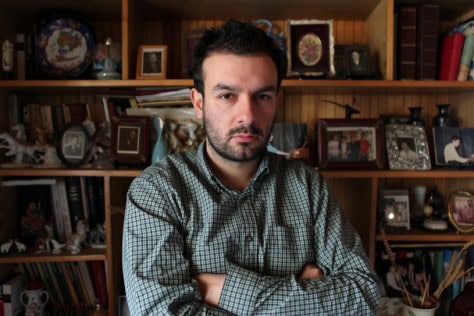There’s something strange about Liars’ current HQ in Silver Lake, about twenty minutes north of downtown Los Angeles. It sort of looks like a drowsy home in the suburbs. Angus Andrews (vocals/guitar), clean-shaven with a neat new haircut and friendly grin, is greeting people at the door while holding the cat, Peanut, and restraining the dog, Butters; Aaron Hemphill (percussion/guitar/synths) is perusing a very scholarly tome on mid-twentieth-century logo design; Julian Gross (drums) is out back, grilling up some hot dogs and preparing his famous potato salad, in deck shoes and khaki shorts, no less. It is frightfully wholesome, considering this is a band that was once known for droning, chanting songs about how there’s “always room on the broom.”
The enigmatic trio has been scattered all over the globe for the past seven years or so: from New York City to Berlin (which Angus still calls home) to New Jersey and now back to greater L.A., where the three originally met while enrolled at CalArts. It’s the first time since then that they’ve all shared an area code.
It’s been a long road for the ever-changing trio, who could just as easily have been swallowed by the waning New York dance-punk craze. After meeting at school, the band moved out to the East Coast, falling in (and living) with musicians like Metric, TV on the Radio and the Yeah Yeah Yeahs. (And yes, the inevitable gossip: Angus dated Karen O, who wrote “Maps” about their relationship.) Liars catapulted the dance-punk genre through its birthing phases with They Threw Us All in a Trench and Stuck a Monument on Top. By the second LP, They Were Wrong So We Drowned, the trio had gravitated towards the densely obscure and harder-to-access. Drowned was an album of mistakes, as the band earnestly puts it. They attempted to produce it without much guidance, assistance or experience, and frankly, the sound quality—particularly that of the drums—was junk.
It seemed as though the trio would evaporate into oblivion, known only for the debut and the lackluster follow-up. Instead, Angus moved to Berlin, and the band cleared its collective head. The acclaimed Drum’s Not Dead made most critics realize that Liars was capable of more than noisy, shiftless anthems about witches. From iconoclasts like Sonic Youth, James Chance, This Heat and many others to post-punk legendaries Killing Joke and The Pop Group, Liars continue a long legacy of expressive punk experimentation while twisting and contorting it all into a unique sound applicable to, and specifically from, the twenty-first century. They’re hesitant to name any bands that inspired them during the recording of the newest record, only citing that ambiguous, anonymous mass of “affecting bands” from their youth.
Liars’ forthcoming self-titled record has no conceptual background; the basis is, as Angus puts it, “the absence of framework.” After making a set of records that were built around bizarre story lines, the trio wanted to “just make a bunch of songs and … not really talk about it too much.” As Aaron points out, they hope that all the tracks on Liars are very affecting, even if they don’t add up to some Grand Scheme. (If one had to pick a theme that the album addresses, it might as well be love and youthful nostalgia.) Instead of constraining themselves to a specific method, Liars just broke free, throwing piano solos into songs where complex drum patterns used to be, or unveiling enchanting melodies where densely layered and controlled cacophony formerly resided.
Some things have not changed with the group, though. For the initial stages at least, Aaron, Angus and Julian were shooting ideas and CD-Rs back and forth between Germany and the United States like they did with the previous LPs. Without this period of creative distance, the scant two-week recording session in Berlin may not have been so harmoniously productive. There was no need or time to make the sort of multimedia goodies that had accompanied previous Liars releases; the album speaks for itself, and all the “extraneous noise” that Angus laments over ceases to exist. It’s all black and white—the extremes of emotion and feeling. “We tried to think about that and what music we were listening to when we were [teenagers] and how to [make music] that would go straight to the gut instead of the cerebral.” A novel and bold stance to take, and certainly evidenced on the first single, “Plaster Casts of Everything,” which sounds like Death From Above 1979 obliterating Nirvana’s “Negative Creep.”
The group was confident enough to go ahead and name the new long-player Liars, as if they were starting over in a sense. They’re willing to release something quickly, with “no deal behind it,” as Aaron says; they’re excited to produce a simple, soft-spoken, but gorgeous package with tastefully minimalist art. Still, Liars “wouldn’t take [any of the previous efforts] back for a second,” according to Angus. Openly baring the wires and exposing the process was, and still is, the aspect of the group that makes them so endearing. As Julian so aptly says, they are “starting anew, rather than annul.”
 Q&A with Larry Gus
Q&A with Larry Gus We Own the Night: The Edison
We Own the Night: The Edison
No Comments